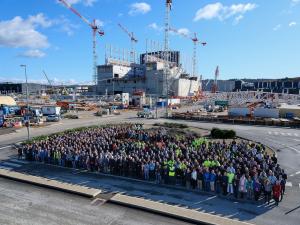The sun was shining, the temperatures were mild for late November, and the backdrop was spectacular.
The men and women standing at the entrance to the construction site represent a staff body that hails from 35 different countries. From the latest published
Social Report (2018) we know that the average age is 44; that 54 percent of the ITER men and women hold a Master's or engineering degree; and that close to 20 percent are PhDs. Three out of four ITER staff members are married or in a legal partnership; 72 percent have a least one child. Global turnover in 2018 was 5.9 percent.
The distribution by Member in November 2019 is as follows: China 9.3 percent; Europe 68.3 percent; India 3.2 percent; Japan 3.5 percent; Korea 5.2 percent; Russia 5 percent; and the United States 5.5 percent (figures updated for 2019).
And of course the ITER family is much larger than the staff category alone. At the ITER Organization in France, approximately 500 contractors contribute to the ITER Project along with approximately 150 interim staff, experts, visiting researchers and interns.
ITER Project Associates—a non-staff employment program that permits institutes from the ITER Members to assign employees on technical as well as support activities to the ITER Organization—swell employment statistics by another 157 people (figure as of 30 November 2019).
The last ITER staff photo was taken in 2017.
You can download the 2018 ITER Organization Social Report here.


